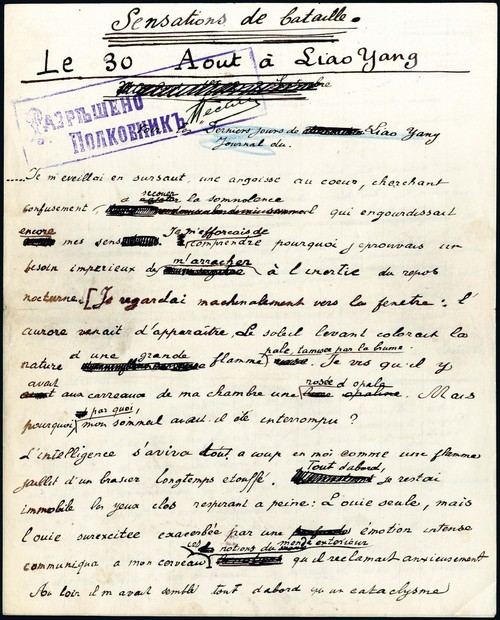
Auction: 14035 - Postal History, Autographs and Historical Documents
Lot: 3113
Historical Documents
Battle of Liaoyang
1904, a 49 page journal of the last days of the battle at Liaoyang, dated "30th August". On the 29th and 30th August the Russian troops were repelling the Japanese advance. Titled "Sensations of Battle", along and detailed account of his view of the battle from inside the city, apparently written in some haste with numerous corrections and additions and signed, "Ludovic Naudeau" with two Russian censor handstamps, "Allowed/Colonel".
Also a six page draft titled, "A Regiment Singing" dated Newchwang, 1st April (no year indicated).
A fascinating account of this battle for one of the key cities in this conflict. Photo
Ludovic Naudeau Charles (1872-1949), born in Boulogne, a journalist, publicist and French writer.
Son of an engineer of the Company of Northern Railway , he was a student in high school Amiens and became a reporter at the age of nineteen. He was one of the first great reporters of the Russo- Japanese War of 1904-05 , during which he was captured and held prisoner in Japan. He managed to escape but was recaptured .
He was present in Russia during the Bolshevik Revolution and was responsible for an interview with Lenin ; questions brought him to spend some time in Soviet prisons .
Journalist at 'Time', he also collaborated with other newspapers and periodicals , especially L'Illustration, and is editor of the Journal. He published several books, including 'Japan', as well as two novels.
He made a very important survey on the issue of birth in France earning him the Medal of Honor of the National Alliance for the growth of the French population in May 1931 and a survey of the French population.
The Battle of Liaoyang (24 August – 4 September 1904) was one of the major land battles of the Russo-Japanese War.
While the Japanese Army settled down in front of Port Arthur for a siege, a large force under Field Marshal Oyama moved north to secure the strategically located rail junction of Liaoyang, on the Mukden - Port Arthur spur of the China Far East Railway, in Manchuria. The battle began on 25 August 1904, with the 158,000 strong Russian armies, attempting to turn the flanks of the Japanese First, Second and Third Armies totaling 125,000 men.
On 26 August 1904, the Japanese First Army took Kosarei Peak and Hung-sha Pass southeast of Liaoyang city after a hard-fought action. General Alexei Kuropatkin, commander-in-chief of the Russian armies, believed that he had been beaten and withdrew from the outer Russian defence line, with the Japanese in pursuit.
From 29 -30 August 1904, the Russian troops managed to repel intense Japanese assaults on the main defence lines south of Liaoyang. By 31 August 1904, the Japanese First Army was crossing the river northeast of Liaoyang,
On 4 September 1904, after a few days of ineffectual counterattacks, Kuropatkin decided to evacuate Liaoyang for Mukden in the early morning. The unfortunate city was then sacked in succession by Russian, Chinese, and Japanese forces.
The Russian armies suffered about 17,900 casualties, the majority of which were captured or missing. However, despite the greater Japanese casualties (23,615 killed, wounded or captured), the Japanese were able to claim victory since the Russians quit the battlefield. The dearly-won Japanese victory at Liaoyang and the fall of Port Arthur shortly thereafter contributed to the major Russian defeat the next year at the Battle of Mukden.
Subject to 20% VAT on Buyer’s Premium. For more information please view Terms and Conditions for Buyers.
Estimate
£500 to £700




